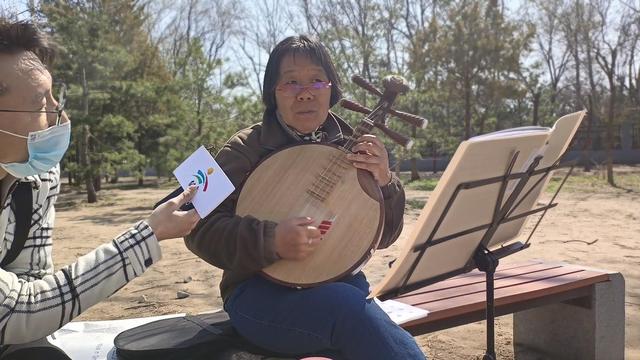The aunt who plays the Yueqin in Yanglinli Park: There are many people around who love it
The location of this neighborhood is in Yukang Park and its surroundings, on the morning of April 1, in the form of random neighborhoods.
The interviewee this time is an aunt who plays the Yueqin in the Yanglin in the park. The aunt is very obsessed with Peking Opera. She also taught her own children to sing opera and sang "My Cousin", expressing that there are many people around her who love it and study with famous teachers. She also talked about Shanghai Peking Opera veteran Wang Peiyu who is very good at spreading Peking Opera culture and can be very good. to spread traditional culture, and at the same time have expectations for us to inherit traditional culture.

Yueqin, originated in the Han Dynasty, is 79 cm long and 14 cm wide. It is one of the three major accompaniment instruments for Peking Opera bands. It can be used for solo performance, instrumental ensemble and accompaniment of singing and dancing, opera, and rap music. It is one of the three major pieces of Peking Opera - Yueqin, Jinghu and Sanxian.
The Yueqin was called "Ruan Xian" in ancient times. It was made by Ruan Xian, the nephew of Ruan Ji, the seven sages of the bamboo forest, hence the name. In the Qing Dynasty, Kong Shangren's "Peach Blossom Fan·Nao Xie" wrote: "At the end, a small student, drinking raw, ugly hitting the cloud gong, net playing the moon qin, Once the flute is introduced." Since the Tang Dynasty, there has been the name of the Yueqin, which is round like a moon and sounds like a qin.
The Yueqin is derived from the ancient Ruan. The neck is short and named because the resonance box is shaped like a full moon. The top and back of the piano are made of thin tungsten wood. A group of two strings is of the same tone, and the strings between the two groups are set according to the relationship of fifths, with nine frets. The Yueqin is played with a plectrum. When playing, the left hand holds the piano to press the strings, and the right hand holds the plectrum to play. Roll, sweep roll, press, tremble, slide, chant and other techniques.
When playing the yueqin, hold the qin obliquely in front of the chest, hold the qin in the left hand and press the strings, and use the index finger or the right hand to pluck the strings to make a sound. The pluck is made of bamboo, horn or bone. Four-dimensional relationship tuning, the four-stringed moon qin can be set to the same tone for both strings, and each string can be set to a tone. The general tuning is as follows: the two-stringed moon qin is tuned as: d1, a1, e1, a1; g1, d2. : g, d1, g1; g, c1, g1 The four-stringed moon qin tuning is: d1, d1, a1, a1; a, d1, g1, c2. The long pole moon qin tuning is: g, c1, g1, c2. Play During dance music, fingers are often tapped on the panel to enhance the warm atmosphere.
Yueqin's voice is gentle, melodious, trickling, gurgling, like water flowing, like deep love, like falling flowers, just like the traditional Chinese feelings, hidden, subtle, unknown, but deep. It can be sad, sad, calm, deep, or even joyful or festive. At this time, the voice is much lighter, which is also in line with our Chinese people's sense of fun and joy.
In the process of chatting with Auntie, I deeply realized her love for Peking Opera and Yueqin, and I can also feel sorry for the beautiful things that are slowly lost in these traditional cultures. In the history of nearly a hundred years, we The traditional culture is gradually decreasing. Among them, there are some neglects that we do not keep pace with the times, and we do not respect the tradition. In the past few days, my biggest feeling is that our arrogance makes our beautiful culture disappear. , this is the most distressing place for me. The street is busy and in a hurry. The most I see is exhaustion, and then I am puzzled, I don't know, or even unwilling. When I think about myself, I have never thought about it. I listened to it today. It was only after the voice of Yueqin that I realized that some sounds and some words are the genes of national memory, and they are beautiful that can be touched, without description or explanation.
 渝公网安备 50010702504639号
渝公网安备 50010702504639号